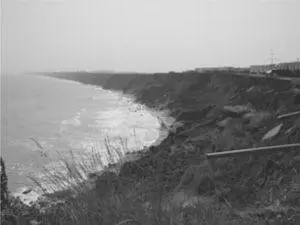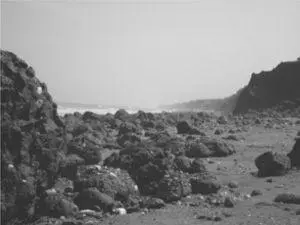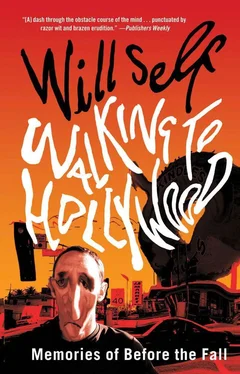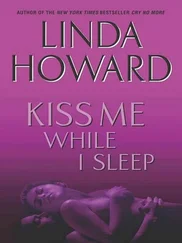Will Self - Walking to Hollywood
Здесь есть возможность читать онлайн «Will Self - Walking to Hollywood» весь текст электронной книги совершенно бесплатно (целиком полную версию без сокращений). В некоторых случаях можно слушать аудио, скачать через торрент в формате fb2 и присутствует краткое содержание. Год выпуска: 2011, Издательство: Grove/Atlantic, Inc., Жанр: Современная проза, на английском языке. Описание произведения, (предисловие) а так же отзывы посетителей доступны на портале библиотеки ЛибКат.
- Название:Walking to Hollywood
- Автор:
- Издательство:Grove/Atlantic, Inc.
- Жанр:
- Год:2011
- ISBN:нет данных
- Рейтинг книги:4 / 5. Голосов: 1
-
Избранное:Добавить в избранное
- Отзывы:
-
Ваша оценка:
- 80
- 1
- 2
- 3
- 4
- 5
Walking to Hollywood: краткое содержание, описание и аннотация
Предлагаем к чтению аннотацию, описание, краткое содержание или предисловие (зависит от того, что написал сам автор книги «Walking to Hollywood»). Если вы не нашли необходимую информацию о книге — напишите в комментариях, мы постараемся отыскать её.
Walking to Hollywood — читать онлайн бесплатно полную книгу (весь текст) целиком
Ниже представлен текст книги, разбитый по страницам. Система сохранения места последней прочитанной страницы, позволяет с удобством читать онлайн бесплатно книгу «Walking to Hollywood», без необходимости каждый раз заново искать на чём Вы остановились. Поставьте закладку, и сможете в любой момент перейти на страницу, на которой закончили чтение.
Интервал:
Закладка:

My lips felt sore and I was walking along the cliff top. The tide was still too high to risk the beach. Another caravan park rolled towards me, but this time there was no fencing between the static homes — which were arranged side-on — and the precipice. Hard standings overhung the abyss — and one had recently collapsed together with the ruptured diaphragm of a paddling pool, the shards of fake-marble planters, a toilet seat and a yucca, which still alive had replanted itself in the mudface, near to a swollen and putrefying hand — or rubber glove.
The dregs of an army camp marched through the badlands towards me. There were overgrown trenches and ramparts studded with sentinel towers, redbrick revetments crumbled into the ruderals, and the heat shimmered over the hedgerows — crystal stairs for flies to shimmy on. The black outline of a man punched a hole in a tower’s doorway. A gun nut. Spent all morning at home, up in his bedroom. ‘Gary!’ his old man called up. ‘’Ave you ’ad yer breakfast, oor what?’ Or what . He came along the flatland from Rolston on a mountain bike, a shotgun slung around one shoulder, a.22 rifle round the other, the pockets of his unseasonable parka bulging with ammunition. He stands in the doorway watching me come on in my Union Army-blue uniform T-shirt, my head full of deep-laid plans for world Zionist domination. He stands stock still, not wanting to aim then track me, but postponing the ecstasy of fluid movement, and so on I come, at every pace expecting his big chin to bristle from the shadows, the nostrils of his shotgun to sneeze snotty lead, his parenthetic shoulders to shrug with the recoil — and so bracket my expiration.
It wasn’t until I was within ten paces of the tower that the gun nut resolved into nothing but the outline of a man bashed in the old steel door. I went on, quaking, and debouched into the road by Mappleton village hall, a Wesleyan chapel dated 1830. Along the road a car slowed beside me and the driver asked if I knew of a petrol station nearby; I said I didn’t, walked on and discovered a jolly little Prius dealership around the next bend, its eco-bunting limp on this hot afternoon, the cars hunched and shiny, the prices exorbitant.
Down a lane, past raggle-taggle cottages, I came upon a declivity leading to the beach. The tide had turned; looking south I could pick out a route worming around the mud slid down, so, despite the prominent signs warning of unexploded ordinance, I set off into the daymare of my own relentless velleity.

At first there were a few dog walkers, some swimmers waisthigh in the churned cream waves and a pod of sunbathers cast ashore on cushions of sea-worn concrete — but soon enough I was utterly alone, picking my way between pinnacles of dried mud studded with pebbles of all colours, from bone-white through eggshell to carmine, mahogany and black. To my right the cliff swooped up, to my left the sea rippled away, while before my eyes the sea fret coiled and shredded — a miasma at once nothingy and permanent; as each buttress of hardened mud formed the flats of this set, so the mist appeared always on the point of being whisked away to reveal the audience of giants seated in the deep.
During the Second War there had been extensive defences along this stretch of the coast; now sections of wall — concrete Z ’s, L ’s and double U ’s, bearded with reinforcing — and even entire blockhouses were embedded in the beach. For a while the mudface was scattered with a selection of the things I had brought with me on my holiday — girders, spars, plastic sheeting, the neuritic plaques, the senile plaques, the braindruse — which, while soiled, nonetheless anchored this liminal desert to the world up above, to the kitchens still fitted, the carports yet intact, beside the bungalows that crouched well away from the edge. Soon enough, though, these relics of the distant present had tumbled by, while the fret still draped offshore, hiding the turbines, and the only player was me, walking on the spot as one shingle spit then the next revolved towards me, each a miniature Spurn Head.
If before I had been held by the loess, now it sucked me in; I had only to let my glimpse penetrate its moist gashes for the entire body to shiver, then contort, as if it were a monstrous and living thing. The heat mounted, the beery waves frothed on the rim of the land, my vain boots ate my feet, while, incontinently, the Andante of Mahler’s Sixth began to syringe my ears — at first a slow seep of syrupy violins and sucrose melody, but then, with recursive eddies of flute and woodwind, larger flows of sound began sloshing around my brainpan, rocking then floating my hollow soul.
Spooked, I gripped the plastic water bottle that had served me for the entire walk as something to hold on to , the all-too-real limb of that phantom body, the Other, who walked beside me yet said nought. The bottle crackled — the Andante flooded on, its cascades of sweet sadness spurting through my eyes, mouth and nose. I put the bottle down on a mud plinth, hoping its mundane shape would trump all this amorphous weirdness. This didn’t work: the Mahler became more turbulent; I slid across glassy sound-boils, whipping into whirlpools of timpani — massed triangles, cow bells and old hubcaps smitten with fenders: ‘Zing! Boom! Tanta-ra!’ A cartoon Cleopatra was hauled towards me reclining on a pyramidal juggernaut drawn by naked and burnished Nubians. ‘Zing! Boom! Tan-ta-ra!’ And although she vanished into the haze, once she was gone the patterns of the pebbles, the gulls twisting into the sky at my approach, the very winding of the sea fret — all these phenomena assumed a demented congruence with the Andante, responding to its every glissade.
It got worse, the mud Romantically writhing, the sandbars flip-flopping, the very rods and cones of my optic nerves made visible, frenziedly dancing to the brassy blare of the movement’s crescendo — until all was blissfully and terribly silenced by the bomb: which lay, small and rusted, a few sustained glockenspiel notes and oboe tones curling into silence around it. I’d nearly trodden on the fucking thing and sat down abruptly, my rucksack marrying my back to the sand, so that I lay panting, parenthesized by my calves.
When I got upright again, I saw there was a shoal of these death fish beached along the tide line — perhaps a hundred in all. Fear renders the body down so that each movement becomes clarified, so, keeping close to the cliff face, I tiptoed past the bombs to the accompaniment of the arrhythmic rasping of my breath in my ears, and atonal cries desiring my life to be not just longer — but forever .
Then the beach was a hard flat pan. Up above on the bluffs stood the stark forms of ruined military installations about to surrender. My bowels slackened and I squatted, back to the cliff, to add my lava to the glacial till. Standing to wipe myself, I saw two small figures coming on along the beach, maybe a quarter of a mile distant. It had been so long since I’d seen another human that, for the aeons until we met, I speculated on what life forms these might be — were they the luminous beings, descended now, their gossamer wings folded into yellow nylon jackets?
It was a Yorkshireman — rotund but hard, like a well-inflated beach ball, his smooth-shaven face cut into by the shadow of his baseball cap. Both he and his son — aged perhaps thirteen — were wearing Hull City football shirts; the black-and-yellow stripes widened over their tummies, then narrowed at the broad leather belts they wore, dangling with chisels and hammers. They rolled towards me across the bled, so at ease that I could not bear to let them pass — had to seize them, tap into their reservoir of honeyed love. As I drew level I cried out, ‘I saw a bomb back there!’
Читать дальшеИнтервал:
Закладка:
Похожие книги на «Walking to Hollywood»
Представляем Вашему вниманию похожие книги на «Walking to Hollywood» списком для выбора. Мы отобрали схожую по названию и смыслу литературу в надежде предоставить читателям больше вариантов отыскать новые, интересные, ещё непрочитанные произведения.
Обсуждение, отзывы о книге «Walking to Hollywood» и просто собственные мнения читателей. Оставьте ваши комментарии, напишите, что Вы думаете о произведении, его смысле или главных героях. Укажите что конкретно понравилось, а что нет, и почему Вы так считаете.












